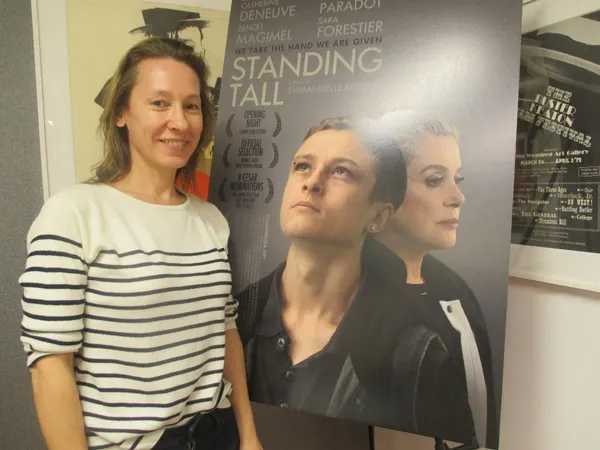 |
| Emmanuelle Bercot's smile Photo: Anne-Katrin Titze |
Emmanuelle Bercot's Cannes Film Festival opener, upright Standing Tall (La Tête Haute) starring Catherine Deneuve, Sara Forestier, with César winning performances by Rod Parodot and Benoît Magimel, co-written by Marcia Romano (Xavier Giannoli's collaborating writer on Marguerite), screened at Rendez-Vous with French Cinema in New York along with Maïwenn's My King (Mon Roi), in which Bercot shines with Vincent Cassel, Two Friends (Deux amis) director Louis Garrel and Isild Le Besco.
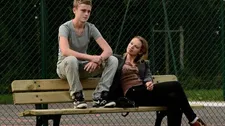 |
| Malony with his mother Séverine (Sara Forestier): "He is not protected by the adult in his life…" |
Abdellatif Kechiche's L'esquive (Games Of Love And Chance), Luc Dardenne and Jean-Pierre Dardenne's fairy tales, Sara Forestier in Katell Quillévéré's Suzanne, using a landscape to breathe, writing the story, the actors helping to create their characters, casting baby faces and being given a second chance entered into our conversation.
Standing Tall ties us from the start to a ferocious little boy, soon to be delinquent teenager Malony, executed by newcomer Parodot with great nuance in aggression and calm as we see the pile up of the bad cards he was dealt. His frightfully incapable mother Séverine - a perfect and fearless performance by Forestier - wants to get rid of him and keep him, love him and kill him. A caring juvenile court judge (Deneuve) and social worker (Magimel) do the best they can to create hope for a violent young man whose fate seems to have been decided upon from birth.
Bercot's film is a plea for a system that gives chances - over and over again, when necessary. One glance at the prosecutor's baby face and the self-righteous judgements of the rookie DA are all an audience needs to understand that some will never give chances because they don't have to.
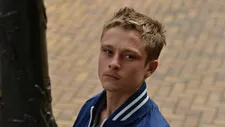 |
| Rod Parodot as Malony |
Anne-Katrin Titze: You start with your protagonist as a little boy. You show the judge, played by Catherine Deneuve interact with this little boy who is so clearly lost already. Was that your idea from the beginning to have him there before you jump into the story of the teenager?
Emmanuelle Bercot: Yes. That is a very good question. That has always been in my head. I really always had the idea of doing that because I thought it was really important that the film begin on a note that was not the cliche of the delinquent child film. Here you see a child who is really young, he is totally defenseless. He is not protected by the adult in his life, in this case, it's his mother. It's important to see that because it's the origin of what he becomes later.
If I had started the film showing him as a 13 year old delinquent, you might automatically think - oh, it's those awful 13 year old kids - the way the cliché usually has it. I wanted to show that many of those awful 13 year olds started out as these defenseless small children.
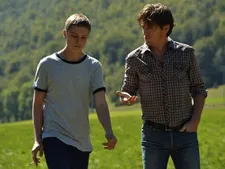 |
| Malony with social worker Yann (Benoît Magimel): "They almost have a fear of the rural…" |
AKT: All the actors are good, but I thought Sara Forestier as the mother is beyond good. It made me think back at some of her other roles. Abdellatif Kechiche's L'Esquive, I believe was her first film ...
EB: Yeah.
AKT: Also Suzanne. Standing Tall brings her to another height of fearlessness. She is so completely without vanity and goes so deeply into that character. I found it really touching. Can you talk a bit about working with her?
EB: I had her in mind while writing. One of the things I always admired in Anglo-Saxon films is that there is this idea that the actor helps to compose, to create the character. This is something we don't generally do in France. With Sara, she is capable of doing that. She is 100% totally malleable and you can have her create this character. At the same time you get 100% totally authentic and believable.
AKT: I thought about the Grimm's fairy tale of the boy who went out in search of what fear was. Not a kitschy Disney tale - it starts out with a boy who is being told that he will always be a burden to his family and will never amount to anything. I would say it is in the way the Dardenne brothers' films are fairy tales. I want to ask you about the use of landscape. When he is in that rehabilitation center, you have some shots of the calm landscape. These are important for the audience to breathe.
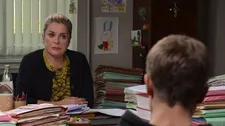 |
| Judge Blaque (Catherine Deneuve) with Malony: "All the scenes are of her performing her professional duties." |
EB: Yes, I think it's a film that for the most part is internal. It takes place in offices, in the courtroom. This was one of the few opportunities in the film, first, as you said, to allow the viewer to breathe. Also it's something very evocative because here you have kids who are sent to this place, who are mostly kids from the city.
They almost have a fear of the rural, to put their body in the immense landscape - because it's so beyond their experience, it's so outside of what they've grown up to know. In a way it's an opportunity for them to re-orient themselves to re-oxygenate themselves to the point where they can turn themselves around.
AKT: I loved what you showed with faces. The rookie DA, the prosecutor - they have such baby faces. They don't seem to know what they are doing. They so completely lack the experience of that boy. You just trusted the faces. What did you tell these actors?
_225.webp) |
| Malony: "If you walk down the street and you encounter these delinquents - you're afraid of them." |
EB: What I was trying to do was work against cliché. For example the district attorney and the others - these are all people who are decision makers who are going to make the decisions that impact this young man's life. Basically, they are not that different from him in age. What really separates them is the social condition, which distinguishes them from understanding the experience of the boy.
When I choose the actors, in this case particularly, I didn't only choose them for their acting ability but also for their faces, the ability of their slightly infantile faces and what that could show.
AKT: Speaking of faces, Catherine Deneuve is wonderfully warm in your film, also stern and understanding. You'd want that face to be the one that is on your side. How did she react when she first read the script?
EB: When she read it, she liked it right away with no reservations. But then I began to see that she was a little bit fearful about it because she had never played a judge before. This was something new to her. In the film, the judge is never seen outside the performance of her job. We know nothing about her private life, we don't see any scenes that involve her in her private life. All the scenes are of her performing her professional duties. She had to be credible in showing the job and also as a person.
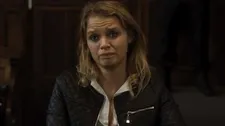 |
| On Sara Forestier portraying Séverine: "I had her in mind while writing." |
AKT: Did you make this film before or after you acted in My King?
EB: I did My King and the day after I was preparing my film.
AKT: Let's talk about the name Malony. There is "mal" in it, one could also think of melody. It's a soft name that you wouldn't immediately associate with someone who is tough. Where did it come from?
EB: There are always some unconscious elements that are there. This name was actually suggested by my co-writer. I had never heard this name before and we decided to use it without any kind of analysis. It's true, there are those plays on words - and the "mal" in the Malony but it wasn't anything premeditated.
AKT: And the mother is Séverine and quite severe. Names don't come out of thin air. The poster is interesting. The boy doesn't look young at all.
EB: True. They took this picture from the nearly last scene of the movie. I think one of the reasons why I chose him was his physical appearance, in particular his face. What I liked about him was that he was somebody who could play 13 years old or 18 years old.
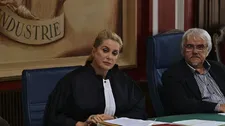 |
| Catherine Deneuve on Judge Blaque: "When she read it, she liked it right away with no reservations." |
AKT: Ultimately, I thought the film was a plea for society to give chances - again and again and again and again. Is that it?
EB: Yes, it is. It is very much a plea for that. And it's also a tribute really to people who work with these young people. Because if it weren't for their passion, their real faith in that things could be changed, this wouldn't happen.
AKT: I am sure you did a lot of research. What surprised you the most?
EB: I didn't have any idea of this world at all before I started to do the research. Normally it's not something that we have access to, that we know about. So everything for me was a discovery. Some of the most surprising things for me was the enormous suffering that these kids are experiencing. Also some of the really painful family histories I was hearing. And the enormous humanity of the people who work with these kids to try to turn things around. To really take the place of the parents and helping them to grow up which the parents were unable to do.
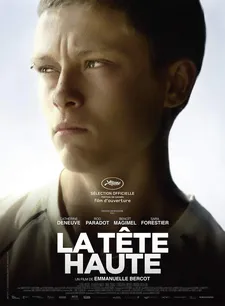 |
| La Tête Haute Cannes poster |
AKT: It isn't a question of evil, clearly.
EB: It's true. But then, don't forget, if you walk down the street and you encounter these delinquents - you're afraid of them. I wanted to delve into the secret of how they arrive at that point.
AKT: There is also some well-placed humour. When Malony is called a violent thief at some point, he protests that he may be violent and he may be a thief but not together.
EB: Some things you just can't make up. I actually heard this in one of the judges' offices. You can't improve on it. It also shows you how manipulative the kids themselves can be and how they adjust what they say to the person who is questioning them. They know where their interests lie and they're going to play to that. Malony is very clever. because of their circumstances, they know the law very well. If they commit a theft with violence, it's going to cost more in terms of penalty than if it's just a theft or being violent.
Standing Tall opens in the US on April 1.





















